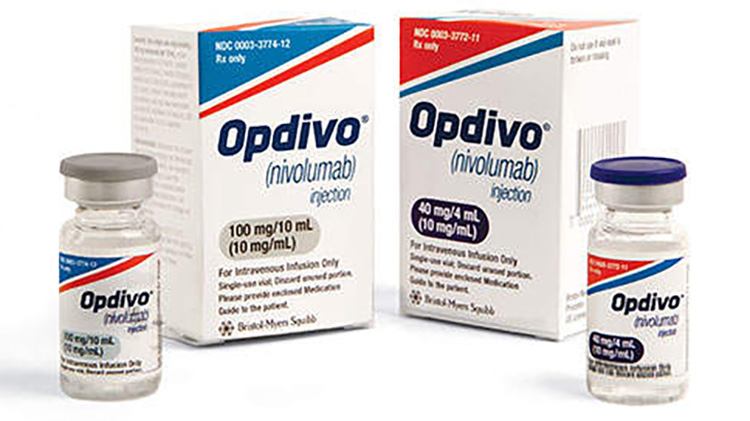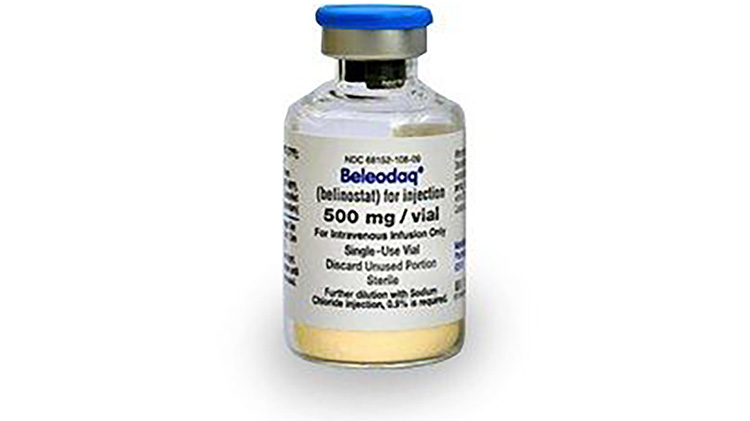Opdivo (Nivolumab) vs Beleodaq (belinostat)
Opdivo (Nivolumab) vs Beleodaq (belinostat)
Opdivo (nivolumab) is an immunotherapy drug that works by blocking the PD-1 pathway, which cancer cells often exploit to avoid being attacked by the immune system; it is used to treat various types of cancers, including melanoma, lung cancer, and kidney cancer, among others. Beleodaq (belinostat) is a type of chemotherapy known as a histone deacetylase (HDAC) inhibitor, which works by interfering with the function of enzymes needed for cell division and is approved for the treatment of peripheral T-cell lymphoma (PTCL). When deciding between Opdivo and Beleodaq, it is crucial to consider the type of cancer being treated, as each medication has a different mechanism of action and is approved for different indications, and the decision should be made in consultation with an oncologist who can tailor the treatment to the patient's specific condition.
Difference between Opdivo and Beleodaq
| Metric | Opdivo (Nivolumab) | Beleodaq (belinostat) |
|---|---|---|
| Generic name | Nivolumab | Belinostat |
| Indications | Various types of cancers, including melanoma, lung cancer, kidney cancer, bladder cancer, head and neck cancers, and others. | Peripheral T-cell lymphoma (PTCL) |
| Mechanism of action | Programmed death receptor-1 (PD-1) blocking antibody, which helps the immune system attack cancer cells. | HDAC inhibitor, which interferes with the growth of cancer cells by altering gene expression. |
| Brand names | Opdivo | Beleodaq |
| Administrative route | Intravenous infusion | Intravenous infusion |
| Side effects | Fatigue, rash, musculoskeletal pain, pruritus, diarrhea, nausea, decreased appetite, cough, dyspnea, constipation, vomiting, etc. | Nausea, fatigue, fever, anemia, vomiting, diarrhea, etc. |
| Contraindications | Severe hypersensitivity to nivolumab or any of its excipients. | Severe hypersensitivity to belinostat or any of its components. |
| Drug class | Immune checkpoint inhibitor | HDAC inhibitor |
| Manufacturer | Bristol Myers Squibb | Spectrum Pharmaceuticals |
Efficacy
Efficacy of Opdivo (Nivolumab) in Treating Lymphoma
Opdivo (nivolumab) is a programmed death receptor-1 (PD-1) blocking antibody indicated for the treatment of various types of cancer, including lymphoma. Specifically, it has shown efficacy in treating classical Hodgkin Lymphoma (cHL) after failure of autologous stem cell transplant (ASCT) or after two or more lines of systemic therapy in patients who are not ASCT candidates. Clinical trials have demonstrated that nivolumab can produce a significant response rate in these patients, with some achieving complete remission. The effectiveness of Opdivo for the treatment of cHL is supported by the overall response rate and duration of response observed in clinical studies.
Efficacy of Beleodaq (Belinostat) in Treating Lymphoma
Beleodaq (belinostat) is a histone deacetylase inhibitor approved for the treatment of relapsed or refractory peripheral T-cell lymphoma (PTCL). This approval is based on the results of a multicenter, single-arm clinical trial where the efficacy was evaluated in terms of overall response rate (ORR), which includes complete and partial responses. The results from the clinical trial have shown that belinostat can induce responses in a subset of patients with PTCL, providing a treatment option for patients with this aggressive form of non-Hodgkin lymphoma who have limited treatment choices after previous therapies have failed.
Comparison of Efficacy in Lymphoma Treatment
When comparing the efficacy of Opdivo and Beleodaq in the context of lymphoma treatment, it is important to note that they are used to treat different types of lymphoma and their efficacy can vary based on the disease subtype and patient characteristics. Opdivo has been primarily studied and used in cHL, while Beleodaq has been focused on PTCL. Both medications have shown promise in their respective indications by improving patient outcomes, but direct comparison is not feasible due to the distinct nature of the lymphomas they treat.
Considerations and Ongoing Research
While the current data supports the efficacy of both Opdivo and Beleodaq in treating certain types of lymphoma, ongoing research is critical to fully understand their long-term efficacy and safety profiles. Additionally, studies are being conducted to explore the potential of these drugs in other lymphoma subtypes and in combination with other therapies. Healthcare professionals should continue to monitor the latest research findings to optimize treatment strategies for lymphoma patients based on the most current evidence.
Regulatory Agency Approvals
Opdivo
-
European Medical Agency (EMA), European Union

-
Food and Drug Administration (FDA), USA

-
Health Canada

-
Pharmaceuticals and Medical Devices Agency (PMDA), Japan

-
Therapeutic Goods Administration (TGA), Australia

-
Medsafe (NZ)

Beleodaq
-
Food and Drug Administration (FDA), USA

Access Opdivo or Beleodaq today
If Opdivo or Beleodaq are not approved or available in your country (e.g. due to supply issues), you can access them via Everyone.org.
How it works

Make an enquiry
Choose the medicine you want to buy, answer a couple of questions, and upload your prescription to speed things up. We’ll get back to you within 24 hours.


Make an enquiry
Choose the medicine you want to buy, answer a couple of questions, and upload your prescription to speed things up. We’ll get back to you within 24 hours.


Breeze through the paperwork
We'll guide you through the required documents for importing unapproved medicine, ensuring you have all the necessary information.


Get a personalized quote
We’ll prepare a quote for you, including medicine costs and any shipping, administrative, or import fees that may apply.


Receive your medicine
Accept the quote and we’ll handle the rest - sourcing and safely delivering your medicine.

Some text on this page has been automatically generated. Speak to your physician before you start a new treatment or medication.
Let's talk
If you have any questions, call us or send us a message through WhatsApp or email:
Contact us




